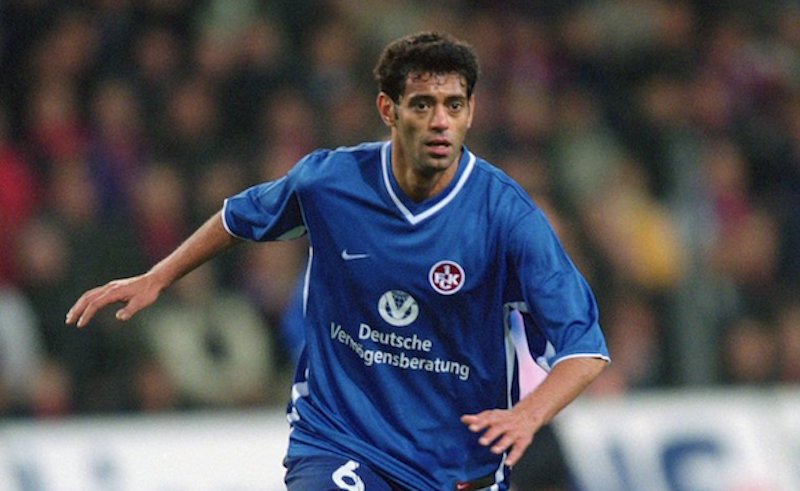Are Young Coptic Footballers Being Oppressed by Egyptian Coaches?
We speak to Egypt's youngest football coach, Mena El Bendary, who's tearing down the walls stopping young Copts following their footballing ambitions.

In Egypt, football isn't merely a sport. It's a rite of passage for many of the country's youth and a national hobby that brings together Egyptians in a common goal regardless of status, class, social background and profession. When football season rolls around, you'll find most cafes, bars and lounges packed with the football fanatics of Egypt in support of their national team and as of late, in worship of our national treasure Mo Salah. Logically, then, the football field is the equal opportunity territory uniting Egyptian athletes based solely on merit and talent - or is it? Hany Ramzy (pictured above) is thought of as one of Egypt's greatest defenders and captained the Egyptian national team during a prolific career. But he's also the only Copt to do so.
Coptic Egyptian football player, Mena El Bendary, is a prime example - a young man that has suffered at the hands of the interfaith dynamics of Egyptian football. Insisting that he's faced religious prejudice - along with a number of other Copts - Bendary decided to take matters into his own hands and to tackle the problem at the root. Starting his own football academy in Alexandria -Je Suis - to create an opportunity for those who claim to have been put in a corner by coaches within official football clubs in Egypt, Bendary is adamant on making a change.

"I used to play at one of Egypt's main football clubs and I was recommended to them by a Muslim coach. A month in, the coach asked me to change my name so I left," says Bendary. "I tried and got rejected by a few other places before I decided to start my own academy."
With over 300 players in his academy, 22-year old Benadary is currently the youngest qualified coach in Egypt's history. He decided to sacrifice the pursuit of his own dreams in order to give younger generations a shot at reaching their goal. Bendary chose the name because it symbolises potential." It means I am. I chose it because I want these kids to be able to say I am capable, I am going to reach my potential and I am going to reachto my goal."
Why have there only been five Coptic players in the top levels of Egyptian football, if there's no discrimination?
Retired Egyptian football player, Ahmed 'Mido' Hossam is one of the people who have spoken about the matter publicly. In an interview with DMC Sport last April, the nomadic footballer asserted there has been an issue with the participation, or lack thereof, of Copts at Egyptian clubs. Speaking against the prejudice, Mido goes on to prove his point by inquiring as to "why have there only been 5 Copt players in the top levels of Egyptian football, if there's no discrimination?." Mido clarifies that a lot of these kids stop playing football as a result of the injustices they face by some coaches. Bendary hopes to save Copt children with footballing ambitions from the kind of rejection that ended his own dreams by creating an environment that fosters acceptance, opportunity and equality. The young coach has been improving on the academy which has been up and running for 3 years now and is working towards turning it into an official club.
"Je suis was initially founded for the Copts who'd gotten rejected because of their religion. Now we have both Copts and Muslims. We want to breed an environment of acceptance. We're all one community, Muslims and Christians. There's no difference when we play, it's only from some of the coaches in the clubs,” claims Bendary. "I need to make a change internally first because this isn't a problem limited to our generation. It's been ongoing for years. How many Copts do we have on our national teams? Barely any. I’d rather sacrifice my own career so that I can actually tackle the problem at the core rather than just have something fleeting."
The coach asked for my name and when I told him Mena, he said, maymesheesh ma3ak mostafa?
Je Suis doesn’t make profit as all the money goes towards expenses. Being an academy and not an official club, the fees for playing matches in the league are between EGP 1000 to 7000. Bendary started the organisation when he found that his was not an isolated case in Egyptian football, asserting that other Christian footballers have gone through variations of the young coach's rejection scenario.
“Honestly, it's frustrating and I don't get why this is the case here. We just want to play football,” says Bendary’s student, Mina Samir. “One of the many incidents that experienced was at a big club. The coach asked for my name and when I told him Mina, he said mayemsheesh ma3ak Mostafa (Does Mostafa work for you)?”

While Samir persisted in going to try-outs despite several dismissals, there are cases of those who simply gave up.
"Je Suis gives us hope. I was lucky to find the academy and I'd never give up football anyway. Even after I got rejected, I continued playing in church tournaments and in Alexandria's football academy. With my brother, it was different though. The first few times he got rejected because of his faith, he decided to quit and change sports completely. Now he's a weightlifter," says Samir.
When he found out my name, he told me he’d call me to let me know if I made it and give me the details. He didn’t even take my phone number
What magnifies the issue even more for Bendary and Samir is that the issue doesn't seem to exist within their social circles.
"A lot of my friends are Muslim and we play football together all the time. Every Saturday, we play a few matches together so I don’t know why some of the coaches differentiate when it comes to professional clubs. It's also not all Muslim coaches, to be fair. Besides, no matter what, I'm going to keep persisting. Look at Mohamed Salah and what he went through to get to where he is. He made it. And he's a Muslim playing among Christians. His religion never made a difference," concludes Samir.

Mena Ayman is another one of Bendary's students who's found solace in Je Suis.
“I passed the trials for the first round of tryouts at one of the clubs and was asked by the captain to sign the papers taking me to the second round. What usually happens once you’re asked to sign your name is that you’re given a paper with the details for the next round and all you have to do is show up. When he found out my name, he told me he’d call me to let me know if I'd made it and give me the details. He didn’t even take my phone number,” Ayman told us.
Irrespective of age, these Egyptians speak out on facing the same issue despite not giving up and persisting in going to try-outs. 26-year old Melad Gaber had been playing for an official club for two years before facing a similar scenario.
“I was playing with a club for 2 years before a new coach was hired. He asked me to change my name. I told him no and I stopped playing football,” explains Mena. “After that incident, I stopped going to try-outs for a while. That is, until I found Je Suis.”
It could be years before Bendary's efforts bear fruit, but what his ambitions offer kids like Mena is a light at the end of tunnel.
Main image taken from Scoopnest.com
























